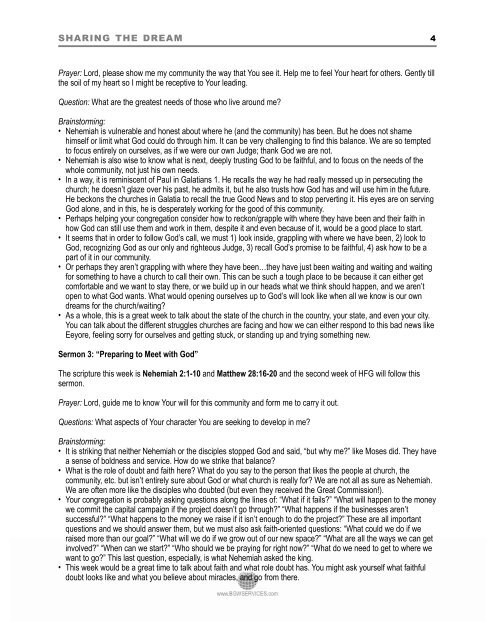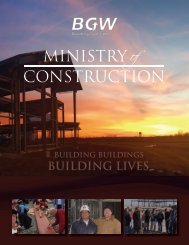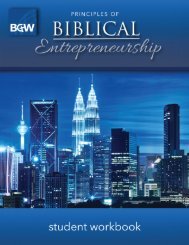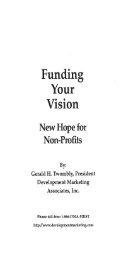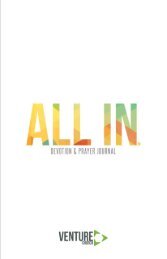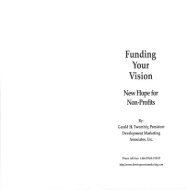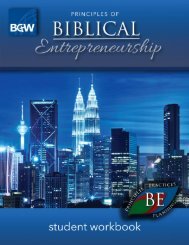Momentum Campaign Full Notebook 2017
You also want an ePaper? Increase the reach of your titles
YUMPU automatically turns print PDFs into web optimized ePapers that Google loves.
SHARING THE DREAM 4<br />
Prayer: Lord, please show me my community the way that You see it. Help me to feel Your heart for others. Gently till<br />
the soil of my heart so I might be receptive to Your leading.<br />
Question: What are the greatest needs of those who live around me?<br />
Brainstorming:<br />
• Nehemiah is vulnerable and honest about where he (and the community) has been. But he does not shame<br />
himself or limit what God could do through him. It can be very challenging to find this balance. We are so tempted<br />
to focus entirely on ourselves, as if we were our own Judge; thank God we are not.<br />
• Nehemiah is also wise to know what is next, deeply trusting God to be faithful, and to focus on the needs of the<br />
whole community, not just his own needs.<br />
• In a way, it is reminiscent of Paul in Galatians 1. He recalls the way he had really messed up in persecuting the<br />
church; he doesn’t glaze over his past, he admits it, but he also trusts how God has and will use him in the future.<br />
He beckons the churches in Galatia to recall the true Good News and to stop perverting it. His eyes are on serving<br />
God alone, and in this, he is desperately working for the good of this community.<br />
• Perhaps helping your congregation consider how to reckon/grapple with where they have been and their faith in<br />
how God can still use them and work in them, despite it and even because of it, would be a good place to start.<br />
• It seems that in order to follow God’s call, we must 1) look inside, grappling with where we have been, 2) look to<br />
God, recognizing God as our only and righteous Judge, 3) recall God’s promise to be faithful, 4) ask how to be a<br />
part of it in our community.<br />
• Or perhaps they aren’t grappling with where they have been…they have just been waiting and waiting and waiting<br />
for something to have a church to call their own. This can be such a tough place to be because it can either get<br />
comfortable and we want to stay there, or we build up in our heads what we think should happen, and we aren’t<br />
open to what God wants. What would opening ourselves up to God’s will look like when all we know is our own<br />
dreams for the church/waiting?<br />
• As a whole, this is a great week to talk about the state of the church in the country, your state, and even your city.<br />
You can talk about the different struggles churches are facing and how we can either respond to this bad news like<br />
Eeyore, feeling sorry for ourselves and getting stuck, or standing up and trying something new.<br />
Sermon 3: “Preparing to Meet with God”<br />
The scripture this week is Nehemiah 2:1-10 and Matthew 28:16-20 and the second week of HFG will follow this<br />
sermon.<br />
Prayer: Lord, guide me to know Your will for this community and form me to carry it out.<br />
Questions: What aspects of Your character You are seeking to develop in me?<br />
Brainstorming:<br />
• It is striking that neither Nehemiah or the disciples stopped God and said, “but why me?” like Moses did. They have<br />
a sense of boldness and service. How do we strike that balance?<br />
• What is the role of doubt and faith here? What do you say to the person that likes the people at church, the<br />
community, etc. but isn’t entirely sure about God or what church is really for? We are not all as sure as Nehemiah.<br />
We are often more like the disciples who doubted (but even they received the Great Commission!).<br />
• Your congregation is probably asking questions along the lines of: “What if it fails?” “What will happen to the money<br />
we commit the capital campaign if the project doesn’t go through?” “What happens if the businesses aren’t<br />
successful?” “What happens to the money we raise if it isn’t enough to do the project?” These are all important<br />
questions and we should answer them, but we must also ask faith-oriented questions: “What could we do if we<br />
raised more than our goal?” “What will we do if we grow out of our new space?” “What are all the ways we can get<br />
involved?” “When can we start?” “Who should we be praying for right now?” “What do we need to get to where we<br />
want to go?” This last question, especially, is what Nehemiah asked the king.<br />
• This week would be a great time to talk about faith and what role doubt has. You might ask yourself what faithful<br />
doubt looks like and what you believe about miracles, and go from there.


